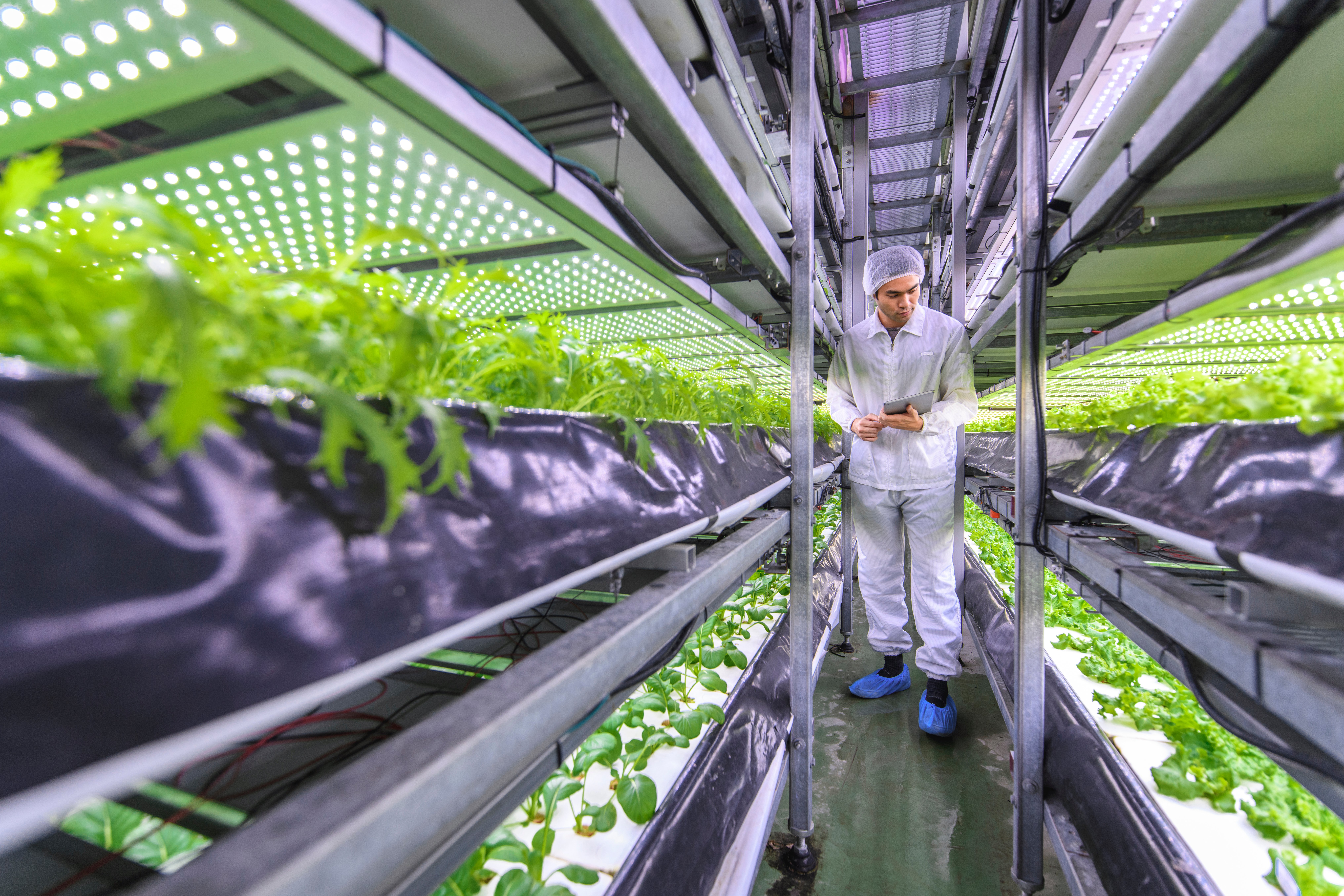What is the role of a food scientist?
food scientists play a critical role in the food industry, specializing in the research and development of new food products or processes. Their primary responsibility is to ensure the safety, quality, and nutritional value of food items, while also considering factors like taste, texture, and shelf-life. food scientists work to optimize food production methods, develop innovative food products, and contribute to advancements in the field of food biotechnology.
Ready to take the next step?
Apply now for a job as a Food Scientist
Production Operator
Location: Morrisburg
Branche: Food Production
Expertise: Production & Manufacturing
Experience: 2 years
Responsibilities Operate and monitor food processing equipment such as extraction systems, evaporators, spray dryers, and packaging machinery. Set up, adjust, and troubleshoot machinery and equipment to support efficient production runs. Perform general maintenance and repairs, resolving mechanical issues to minimize downtime. Monitor and control processing conditions (temperatures, pressures, flow rates, etc.) to ensure consistency and product quality. Conduct regular quality checks on raw materials, in-process product, and finished goods to meet specifications. Maintain accurate records of production, maintenance, machine settings, and inventory. Follow strict hygiene, workplace safety, food safety, and environmental protocols. Collaborate with production, maintenance, and quality assurance teams to troubleshoot and improve processes. Support waste management processes and ensure compliance with environmental and food safety standards. Stay updated on industry best practices, regulations, and equipment requirements.
OT Manager
Location: Veghel
Branche: Food Production
Expertise: IT & Shared Services
Experience: 4 years
Je komt terecht op een grootschalige productielocatie met een cruciale rol binnen de internationale ingrediëntenketen. De afdeling bevindt zich in een transitiefase, waardoor je veel ruimte krijgt om écht impact te maken. Herstructureren en versterken van het team. Je geeft leiding aan een team van interne en externe engineers, definieert heldere rollen en verantwoordelijkheden en brengt de juiste mensen op de juiste plek. Je bouwt aan een cultuur van eigenaarschap, ontwikkeling en samenwerking - en durft daarbij ook lastige beslissingen te nemen. Borgen van OT-operations en security. Je bent verantwoordelijk voor het onderhouden en verbeteren van de OT-infrastructuur (level 0-4), inclusief monitoring, ITIL-procesmanagement, cybersecurity en data-integriteit. Je waarborgt compliance met relevante standaarden (o.a. ISA 88/95/99/102) en bewaakt auditbevindingen en toegangsbeheer. Ontwikkelen en realiseren van de OT-roadmap. Je ontwikkelt en implementeert de site OT-strategie en zorgt dat deze aansluit op globale OT-policies en technische standaarden. Je beheert het OT-budget, onderbouwt investeringen en bewaakt forecasting en inkoopactiviteiten. Stakeholdermanagement op hoog niveau. Je werkt nauw samen met Technical Services, global OT-verantwoordelijken en andere technische disciplines om continuïteit, veiligheid en innovatie te waarborgen.
Inside Sales Engineer
Location: Berkel en Rodenrijs
Branche: Internal Sales & Marketing
Expertise: Marketing & Sales
Experience: 1 years
Wat ga je doen? Je analyseert klantvragen en vertaalt deze naar duidelijke en concurrerende offertes. Je bent het eerste aanspreekpunt voor klanten tijdens het offertetraject en stemt inhoudelijk af waar nodig. Je stelt calculaties en technisch-commerciële voorstellen op voor projecten en service & maintenance. Je bewaakt het offertetraject van A tot Z en zorgt voor een correcte administratieve afhandeling. Na opdracht zorg je voor een snelle en zorgvuldige overdracht richting uitvoering. Je handelt volgens de geldende veiligheids-, gezondheids- en kwaliteitsrichtlijnen (ARBO/VCA).
Product Development Specialist
Location: Wageningen
Branche: Food Production
Expertise: Production & Manufacturing
Experience: 2 years
Lead and support the development and implementation of new dairy products, ensuring compliance with nutritional targets, claims, shelf life, cost price and sensory quality. Execute renovation projects such as quality improvements, raw material optimizations, new specifications and recipe transfers between production sites. Initiate, organize and perform product and application tests at lab, pilot and factory scale, including analysis, interpretation and reporting of results. Perform high-level data analysis to support nutrition frameworks and cost-saving programs, and present findings to internal stakeholders.
Kill Floor Supervisor
Location: Toowoomba
Branche: Life Sciences
Expertise: Production & Manufacturing
Experience: 2 years
Key Responsibilties: Lead, support, and develop production teams across the kill floor and various departments Oversee production performance Ensure full compliance with food safety, hygiene, AQIS, MSA, Halal, and all relevant Australian Standards Promote a strong culture of workplace safety, employee wellbeing, and animal welfare Manage downtime reporting, coordinate maintenance activities, and drive continuous improvement initiatives Work collaboratively with QA, HR, Maintenance, and Livestock teams to achieve high operational standards Identify, evaluate, and implement opportunities for business growth and process enhancements
Rendering Supervisor
Location: Toowoomba
Branche: Life Sciences
Expertise: Production & Manufacturing
Experience: 2 years
Key Responsibilities: Lead and oversee a team of operators and labourers, ensuring all tasks are performed safely Proactively drive WHS initiatives, including PPE checks, lock-out/tag-out compliance, and safe manual handling practices Deliver toolbox talks and provide day-to-day leadership to the team Monitor equipment, coordinate maintenance needs, and troubleshoot issues to minimise downtime and improve efficiency Ensure all rendering processes meet quality, food safety, environmental, and regulatory standards Maintain accurate production, yield, and inventory records in line with company and compliance requirements Conduct routine inspections to identify hazards or process improvements, supporting continuous improvement initiatives Assist with scheduling, leave approvals, and general workforce management to ensure adequate staffing and smooth operations
Medical Science Liaison
Branche: Pharmaceuticals
Expertise: Planning & Testing
Experience: 3 years
Responsibilities Establish and maintain relationships with key thought leaders, regional advocates, healthcare organizations, professional societies and government contacts. Provides accurate and up-to-date scientific information that supports the company's product and disease strategies Builds and maintains rapport with medical professionals and their clinic staff Represent Allergan at national and regional scientific meetings and professional congresses. Collaborates with Medical Advisor in the development and coordination of Allergan sponsored symposia and speaker's bureau Identify and develop advocates for participating in Allergan sponsored clinical trials, scientific symposium and speaker bureau and advisory boards. Follow-up on unsolicited investigator-initiated research proposals and publication opportunities. Assist in training sales and business personnel. Develops territory routing that effectively supports the medical information needs of the assigned geography Maintains effective budgetary control of medical expenses Completes administrative responsibilities, as required, on time Carries out responsibilities in accordance with the organizations, federal and provincial laws and regulations Knowledge Health Canada (HC), Food and Drug Administration (FDA) current Good Manufacturing Practices (cGMP), PAAB, Rx&D, PMPRB and other regulatory requirements. Public speaking, scientific story telling and presentation methods and techniques. Pharmacology and pharmaceutical principles, practices and their application. Principles of mathematical and statistical analysis in clinical studies
Maintenance Planner II
Location: Denver
Branche: Mining
Expertise: Quality Management
Experience: 3 years
This role will require someone to be on-site in Climax, Colorado. If not local, a $200/day stipend will be provided to cover costs of lodging, food and transportation. In this role, you will lead workload activities by planning, scheduling, measuring and analyzing maintenance activities with site supervisor. Duties: Plan, schedule and analyze execution to generate successful resolution of issues. Manage and maintain the integrity of the information management systems to achieve the assigned planning and scheduling objectives. Under the guidance of the Equipment Reliability Standards (ERS) interact with the Supervisor in the assigned area to establish and monitor planned schedules for assigned activities. Conduct and participate in planning meetings. Review, prioritize and schedule work orders. Responsible for "runtime forecasting" process execution and outcomes. Provide guidance and mentor Planner I's. Support the area supervisor in all facets of job preparations, execution and follow-up, including time spent "in the field" to ensure readiness and availability of materials and equipment. Develop, monitor and adjust schedules for assigned activities and maintain schedules in SAP. Collaborate with other planners and supervisors in long-range planning and scheduling for planned major shutdowns regarding priorities, resource requirements, material requirements, budget forecasts, etc. Support execution of contracts by preparing scopes of work for internal and external jobs. Initiate requests for parts and materials. Interface with Global Supply Chain. Assist with maintenance management decisions (budgets, weekly forecasting) Generate KPI reports
M365 - Powerplatform Specialist
Location: Brussel
Branche: Information Technology
Expertise: IT & Shared Services
Experience: 3 years
In deze rol vertaal je technische vraagstukken naar duidelijke en bruikbare inzichten voor het teammanagement. Je werkt deze inzichten uit in gestructureerde voorstellen en plannen van aanpak, afgestemd op de noden van de business en rekening houdend met de strategische richtlijnen en regels van de klant. Daarnaast draag je bij aan het opbouwen van kennis en samenwerking binnen het team. Je kan anderen meenemen in nieuwe oplossingen en mee richting geven aan de uitvoering van projecten, zonder daarbij de teamdynamiek uit het oog te verliezen. Je bouwt bruggen tussen techniek en de business.
Project Engineer
Location: Scoresby
Branche: Life Sciences
Expertise: Research & Development
Experience: 4 years
Reporting into the Capital Engineering Manager, this role will suite someone with wealth of experience in food and beverage industry, preferably from confectionary background. They will be responsible for the planning, development, and execution of capital investment projects within the supply chain network. The Project Engineer will lead and manage technical feasibility, design, and implementation, ensuring all projects align with business strategy, quality, safety, and environmental standards. You will be working in a collaborative and high-performing engineering environment, delivering a variety of projects that support manufacturing excellence, automation, and sustainability goals. Project Development Phase: Lead the development of capital investment projects, ensuring strong business cases, technical feasibility, and alignment with strategic goals. Deliver accurate project scopes, budgets, and timelines. Ensure compliance with HSE, quality, procurement, and sanitary design standards. Engage stakeholders across functions to align on technical requirements and outcomes. Project Execution Phase: Manage project execution including installation, commissioning, and handover to operations. Oversee contractor management, resource planning, and compliance with work permits and site safety protocols. Drive project completion on time, to budget, and to required quality standards. Utilize structured project management methodologies (e.g., IIM framework) and tools. Lead and support cross-functional teams and mentor junior engineers. Recognize and promote team contributions and development.
What do food scientists do?
food scientists are involved in various essential tasks to enhance and innovate the food industry. They collaborate with cross-functional teams, including food technologists, engineers, nutritionists, and marketers, to create and refine food products that meet consumer demands and comply with regulations.
In this role food scientists conduct research to understand consumer preferences, study market trends, and identify opportunities for new food product development. They work on designing experiments, conducting sensory evaluations, and analyzing data to optimize product formulations and manufacturing processes.
Additionally, they are responsible for ensuring that food products meet industry standards and adhere to food safety regulations. This involves conducting microbiological testing, evaluating food packaging, and implementing quality control measures.
Furthermore, food scientists contribute to the improvement of existing food products by conducting research on ingredient functionality, nutritional enhancement, and preservation methods. They play a vital role in addressing food-related challenges, such as food waste reduction, clean label formulations, and sustainable sourcing.
Staying updated with the latest advancements in food science, technology, and regulatory requirements is essential for food scientists. By integrating cutting-edge biotechnology in food practices, they can contribute to the growth and success of food-related research and innovation.
What are the required skills for a food scientist?
To excel as a food scientist, individuals must possess a diverse technical and non-technical skillset. Strong problem-solving and analytical abilities are essential for conducting experiments, analyzing data, and developing innovative food products. Excellent communication skills are necessary for collaborating with cross-functional teams, presenting research findings, and effectively conveying technical information to non-technical stakeholders.
Additionally, in-depth knowledge of food science principles, food chemistry, food microbiology, and food processing technologies are vital for ensuring the safety and quality of food products. Knowledge of nutrition and dietary requirements is also beneficial when designing healthier food options. Acute attention to detail and organizational skills are crucial for managing multiple projects and adhering to strict timelines in the fast-paced food industry.
Where do food scientists work?
food scientists can find job opportunities in various sectors, including food manufacturing companies, food biotechnology research and development laboratories, government agencies, and academic institutions. They may also work for food startups or collaborate with large food corporations to drive innovation in the food industry.
Common food scientist responsibilities
Lead and collaborate with cross-functional teams in food research and development projects;
Conduct experiments and sensory evaluations to optimize food product formulations;
Analyze data and interpret results to improve food quality and safety;
Ensure compliance with food safety regulations and industry standards;
Research and identify opportunities for new food product development;
Improve existing food products through ingredient functionality and nutritional enhancements;
Contribute to food-related challenges, such as sustainability and food waste reduction;
Stay informed about the latest advancements in food science, biotechnology, and regulations;
Communicate effectively with colleagues and stakeholders to drive food innovation and success.
Qualifications for food scientists
To become a food scientist, candidates should possess at least a Bachelor's degree in food science, food technology, or a related field. Advanced degrees or certifications in food science or food technology are advantageous.
Other essential qualifications include:
- 2-4+ years of experience in food research and development or related fields;
- In-depth knowledge of food science principles, food chemistry, and food processing technologies;
- Strong problem-solving and analytical skills;
- Excellent verbal and written communication abilities;
- Attention to detail and organizational skills;
- Familiarity with food safety regulations and quality control measures;
- A passion for driving innovation in the food industry and contributing to advancements in food technology.




